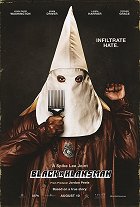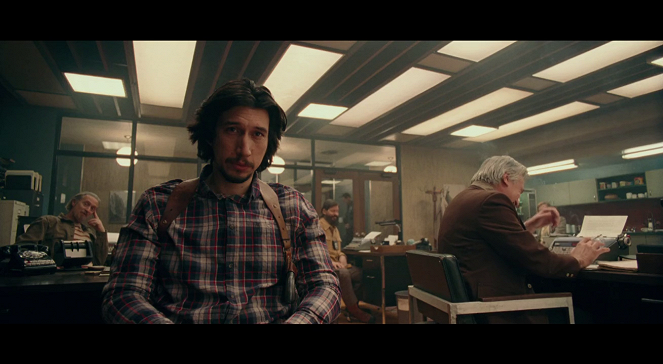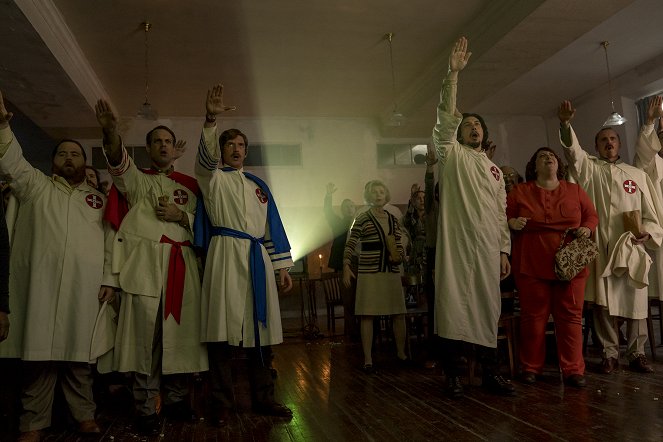Directed by:
Spike LeeCinematography:
Chayse IrvinComposer:
Terence BlanchardCast:
John David Washington, Adam Driver, Topher Grace, Laura Harrier, Jasper Pääkkönen, Michael Buscemi, Ryan Eggold, Paul Walter Hauser, Corey Hawkins (more)VOD (3)
Plots(1)
From visionary filmmaker Spike Lee comes the incredible true story of an American hero. It’s the early 1970s, and Ron Stallworth (John David Washington) is the first African-American detective to serve in the Colorado Springs Police Department. Determined to make a name for himself, Stallworth bravely sets out on a dangerous mission: infiltrate and expose the Ku Klux Klan. The young detective soon recruits a more seasoned colleague, Flip Zimmerman (Adam Driver), into the undercover investigation of a lifetime. Together, they team up to take down the extremist hate group as the organization aims to sanitize its violent rhetoric to appeal to the mainstream. (Universal Pictures UK)
(more)Videos (7)
Reviews (14)
Previously it would have been a biographical drama or a heist film, but to express his political viewpoint this time, Spike Lee uses and reworks for his own needs the conventions of cop films about dual identity. The obstacles that the heroes have to overcome in accomplishing their mission come not only from the outside, but also in the form of their colleagues and superiors, who are unable to let go of their own prejudices and represent a system that disadvantages a certain part of the population. The pairing of two disparate characters serves for more than just creating comical situations that bring levity to a serious topic. It is also a condition for the implementation of Stallworth’s bold plan and, at the same time, expression of the film’s central conviction that the path to success is conditioned by cooperation, the struggle for shared values (though each one is completely different, they appear before the KKK members as one person), which can also be understood as a disputation with blaxploitation films, whose style BlacKkKlansman imitates. ___ The two protagonists start to think more about their respective identities following confrontations with white nationalists, who see them, as a black and a Jew, as a threat comparable to the plague and cholera. For example, in reply to the question of whether he is a Jew, Zimmerman initially answers “I don't know”. He later admits that, because of assimilation, he had never thought about his Jewishness, but he is now beginning to reconsider his position. Like his partner, he stops taking his infiltration of the Ku Klux Klan as nothing more than a job, as it becomes a personal matter for him. While Stallworth stops running away from the fact that he is black, Flip begins to proudly defend his Jewishness “thanks” to a group of anti-Semitic imbeciles. ___ Racists legitimise their words and actions by creating artificial enemies and spreading fear of a race war or the Jewish-Bolshevik conspiracy. Their vocabulary plays a fundamental role in this, though it does not have any sort of richness and displays an elementary ignorance of grammar, but it is also expressive enough to elicit strong emotions and attract unthinking crowds. Emotions replace the ability to work with facts and to argue more thoughtfully. One of the bigots reveals the absence of elementary logic in his attitudes when Flip warns him that it is nonsensical to deny the Holocaust, during which several million Jews were murdered and was thus the most amazing event in history from a white Nazi’s perspective. Within the KKK, relationships are established exclusively on the basis of shared hatred. Joining the organisation is conditioned by knowledge of the hate code (various terms of abuse for anyone who is not a white heterosexual American). However, it is necessary to make the language of this closed group widely known, for example with the aid of Hollywood epics such as The Birth of a Nation. ___ The wave of racially motivated violence in the 1970s was a backlash to some of the minor victories achieved by African-Americans in the previous decade. Similarly, the strengthening position of the extreme right in America today, stoked by the statements of the sociopath whom Spike Lee calls the “Orange motherfucker” and “Agent Orange”, can be seen as “retaliation” for the eight years of the Barack Obama administration. Lee’s film is permeated by parallels with current events in the United States and Europe. Even without the shocking postscript, it would be clear that, as in his earlier films, Lee used a historical theme to draw attention to the persistent intolerance of certain social groups. Though the style changes, the essence remains and the world will continue to need many heroes like Ron Stallworth and Heather Heyer. BlacKkKlansman says as much, perhaps without much nuance, but urgently enough to open the eyes of at least a few people who do not yet have totally whitewashed brains. 90%
()
(less)
(more)
A racist African-American picture based on an incredible true story. Although Spike Lee slightly bungled the dramaturgy and reveals details that are unnecessary for the plot, it’s bearable. The acting performances are excellent, especially Driver as the cop who risks his neck and the great young Washington, who knows how to come across as polite and pissed off all at once.
()
The story, despite its great dramatic and meager sociological potential, only tickles its own possibilities and entertains with its graduated, unpredictable ending. The rest of the time (and especially in the disgracefully stupidly pasted-on epilogue), it's Spike Lee at his worst, that is, in the form of a blind preacher shouting at the top of his lungs. I fully agree with the thoughts he wants to convey, but their format is so terribly tired that a week after the screening I have trouble remembering the pleasant dueling between John David Washington and Adam Driver, and all I can recall are the endlessly repeated references to the pop culture of the time and the social clues for the hard-hearted, which is why I am being a bit more strict in my rating this time around.
()
Spike Lee made a decidedly interesting film about the first black cop and his infiltration of the Ku Klux Klan, which is both unprecedented and attractive stuff, but it lacked balls. John David Washington is unexpectedly good and if he becomes a star I won't be angry at all. Adam Driver surprised me as well and Jasper Pääkkönen was a proper sleazeball. The film is a bit too long for my taste and offers no eye candy sequences; it’s emotionally cold, there’s no action empty, and the humour passed me by, but still I wasn't bored and finished it with curiosity without any problems. But I am not the target audience.60%
()
Spike Lee is an extremist, and also a big asshole. BlacKkKlansman is a film with a humour so black that it could pick cotton in the fields of Birth of a Nation; it pushes political incorrectness to the limit and works very smartly with the development of the two lead characters, who first must pretend they are one, in order to really become one in the end. There are moments that are packed with ideas and satirical jokes, but also others when its formally artificial and lacking credibility, but Spike compensates that with the use of archive footage and explicit allusions at Trump. In any case, heavy-hitting quality that, thanks mainly to the dynamic narration and the amazing actors, never falls into a sterility that it obviously fears like the Devil fears the cross. 80%
()


